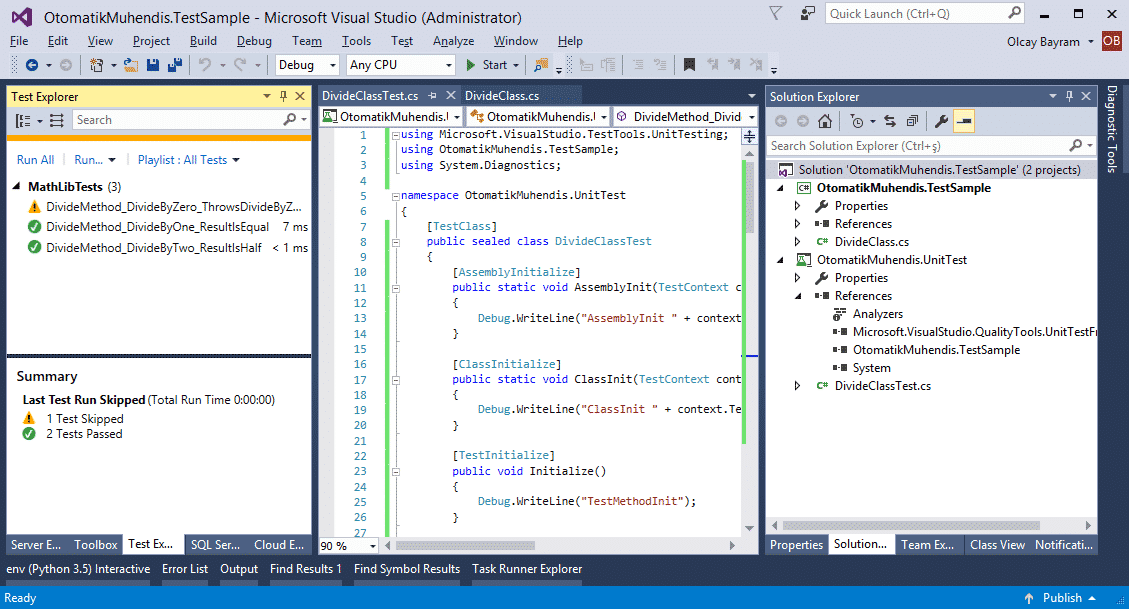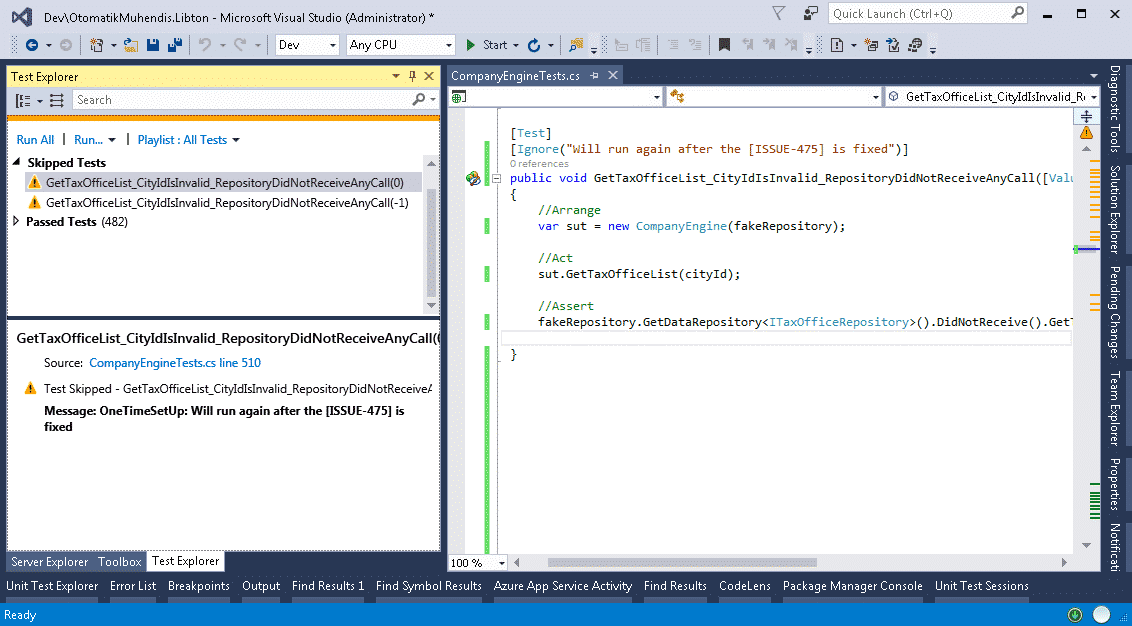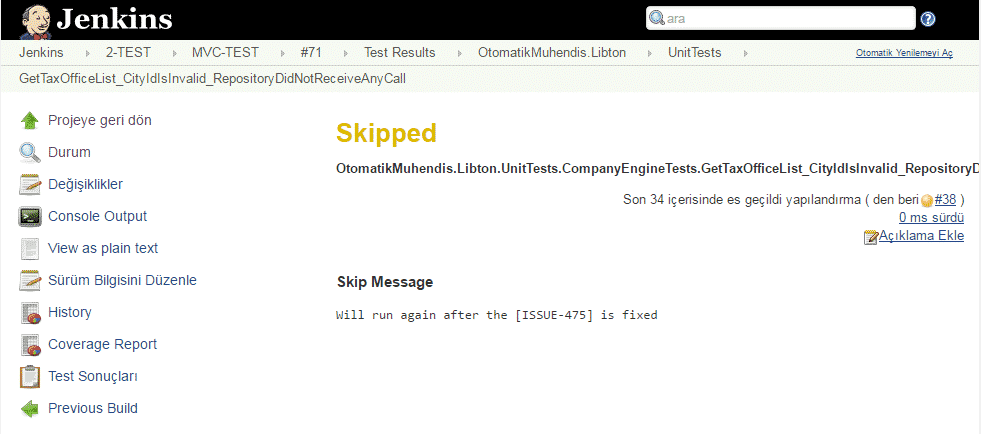In this post, I will explain frequently used attributes and annotations in various testing frameworks.
It is called attributes in the .NET environment and annotations in Java. We use them to declare information about methods, types, properties, and so on.
We will discuss frequently used ones to run test scenarios properly. You would find comparisons of NUnit, MSTest, xUnit.net, and JUnit testing frameworks down below.
| NUnit | MSTest | xUnit.net | JUnit 4 | Junit 5 | Description |
|---|---|---|---|---|---|
| [TestFixture] | [TestClass] | – | – | – | This indicates that the class has test methods. |
| [Test] | [TestMethod] | [Fact] | @Test | @Test | Marks a test case. |
| [OneTimeSetUp] | [ClassInitialize] | IClassFixture | @BeforeClass | @BeforeAll | The one-time triggered method before test cases start. |
| [OneTimeTearDown] | [ClassCleanup] | IClassFixture | @AfterClass | @AfterAll | The one time triggered method after test cases end. |
| [SetUp] | [TestInitialize] | Constructor | @Before | @BeforeEach | Triggered before every test case. |
| [TearDown] | [TestCleanup] | IDisposable.Dispose | @After | @AfterEach | Triggered after every test case. |
| [Ignore] | [Ignore] | [Fact(Skip=”reason”)] | @Ignore | @Disabled | Ignores the test case. |
| [Category(“”)] | [TestCategory(“”)] | [Trait(“Category”, “”)] | @Category(*.class) | Categorizes the test cases or classes. |
There is little difference between them except that the xUnit framework. xUnit prefers inheritance for the ones that it doesn’t want to be used very often.
Category separation is a best practice on testing because you could see your test cases by their category on your test runner tool or run them in a Continuous Integration application separately.
If you don’t want to run a test temporarily you could use ignore the attribute. Your test runner tool will skip that test and show it with the provided message.
Let’s build a test project to see the order of the attributes precisely.
Create a new Class Library project and a method to test like the one below.
namespace OtomatikMuhendis.TestSample
{
public class DivideClass
{
public static int DivideMethod(int numerator, int denominator)
{
return (numerator / denominator);
}
}
}
Add a Unit Test Project to the Solution and add a reference of the class library project.
Replace the unit test class with the following example.
using Microsoft.VisualStudio.TestTools.UnitTesting;
using OtomatikMuhendis.TestSample;
using System.Diagnostics;
namespace OtomatikMuhendis.UnitTest
{
[TestClass]
public sealed class DivideClassTest
{
[AssemblyInitialize]
public static void AssemblyInit(TestContext context)
{
Debug.WriteLine("AssemblyInit " + context.TestName);
}
[ClassInitialize]
public static void ClassInit(TestContext context)
{
Debug.WriteLine("ClassInit " + context.TestName);
}
[TestInitialize]
public void Initialize()
{
Debug.WriteLine("TestMethodInit");
}
[TestMethod]
[TestCategory("MathLibTests")]
public void DivideMethod_DivideByOne_ResultIsEqual()
{
//Arrenge
var numerator = 6;
var denominator = 1;
//Act
var result = DivideClass.DivideMethod(numerator, denominator);
//Assert
Assert.AreEqual(numerator, result);
Debug.WriteLine("TestMethod_DivideMethod_DivideByOne_ResultIsEqual");
}
[TestMethod]
[TestCategory("MathLibTests")]
public void DivideMethod_DivideByTwo_ResultIsHalf()
{
//Arrenge
var numerator = 6;
var denominator = 2;
//Act
var result = DivideClass.DivideMethod(numerator, denominator);
//Assert
Assert.AreEqual(numerator, result * denominator);
Debug.WriteLine("TestMethod_DivideMethod_DivideByTwo_ResultIsHalf");
}
[TestMethod]
[TestCategory("MathLibTests")]
[ExpectedException(typeof(System.DivideByZeroException))]
[Ignore]
public void DivideMethod_DivideByZero_ThrowsDivideByZeroException()
{
//Arrenge
var numerator = 6;
var denominator = 0;
//Act
var result = DivideClass.DivideMethod(numerator, denominator);
//Assert
Assert.AreEqual(numerator, result * denominator);
Debug.WriteLine("TestMethod_DivideMethod_DivideByZero_ThrowsDivideByZeroException");
}
[TestCleanup]
public void Cleanup()
{
Debug.WriteLine("TestMethodCleanup");
}
[ClassCleanup]
public static void ClassCleanup()
{
Debug.WriteLine("ClassCleanup");
}
[AssemblyCleanup]
public static void AssemblyCleanup()
{
Debug.WriteLine("AssemblyCleanup");
}
}
}

Test output after the test run:
AssemblyInit DivideMethod_DivideByOne_ResultIsEqual ClassInit DivideMethod_DivideByOne_ResultIsEqual TestMethodInit TestMethod_DivideMethod_DivideByOne_ResultIsEqual TestMethodCleanup TestMethodInit TestMethod_DivideMethod_DivideByTwo_ResultIsHalf TestMethodCleanup ClassCleanup AssemblyCleanup

Olcay Bayram is a software enthusiast; currently a developer of e-commerce team of Kariyer.net. Apart from the BSc, he holds a masters in information technologies and has a blog on his own http://otomatikmuhendis.com/



